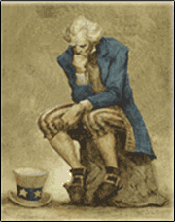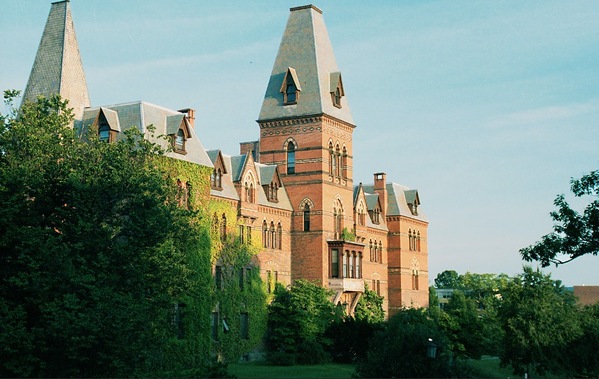
(function(d, s, id) { var js, fjs = d.getElementsByTagName(s)[0]; if (d.getElementById(id)) return; js = d.createElement(s); js.id = id; js.src = “https://connect.facebook.net/en_US/sdk.js#xfbml=1&version=v3.0”; fjs.parentNode.insertBefore(js, fjs); }(document, ‘script’, ‘facebook-jssdk’)); –>
–>
December 19, 2023
Courage is assumed when one joins the US Marines. After all, the Marines are known for fostering and appreciating physical courage, but they’re also taught to always look for moral, ethical, and intellectual courage. Those are cherished attributes in a service built on meritocracy. I continue to honor those qualities when I see them and, recently, Cornell’s president showed them.
‘); googletag.cmd.push(function () { googletag.display(‘div-gpt-ad-1609268089992-0’); }); document.write(”); googletag.cmd.push(function() { googletag.pubads().addEventListener(‘slotRenderEnded’, function(event) { if (event.slot.getSlotElementId() == “div-hre-Americanthinker—New-3028”) { googletag.display(“div-hre-Americanthinker—New-3028”); } }); }); }
When I left active duty in 1975 after having served as a Marine pilot during the Vietnam War, I did not know what to expect when I began as a graduate student at Cornell University. During the Vietnam War, Cornell had been noted for having a very large cadre of anti-war activists. To my surprise, I was totally accepted into the student body without any rancor or negative judgment. It was a remarkable place for learning.
In the summer of 1976, we wanted to have a 4th of July party on campus to celebrate America’s bicentennial. The specific Fourth was a double celebration at Cornell for that was when Israel conducted Operation Thunderbolt to rescue the hostages held at Entebbe, it’s remembered as the most successful commando raid in history. Everyone was awed by how Israel’s leadership, backed up by one of the most professional militaries in the world, was so successful in saving so many lives.
Sadly, though, its leader, Yonatan “Yoni” Netanyahu, was the only military casualty, killed as he led his team from the front. Yoni’s death meant that, for the Israeli students on campus, Israel’s victory was bittersweet. That’s because Yoni’s father, Benzion Netanyahu, had been a distinguished history Professor at Cornell.

Image: Sage Hall at Cornell University in 1985 by Upsilon Andromedae. CC BY 2.0.
‘); googletag.cmd.push(function () { googletag.display(‘div-gpt-ad-1609270365559-0’); }); document.write(”); googletag.cmd.push(function() { googletag.pubads().addEventListener(‘slotRenderEnded’, function(event) { if (event.slot.getSlotElementId() == “div-hre-Americanthinker—New-3035”) { googletag.display(“div-hre-Americanthinker—New-3035”); } }); }); }
Israel’s fate and its connection to Cornell made the news again after Hamas’s October 7 attack on Israel. This time, though, Cornell’s students weren’t proud of Israel. Instead, vicious, potentially deadly antisemitism reared its ugly head.
Russell Rickford, an associate history professor, stated that he was “exhilarated” by the Hamas attack. He later apologized: I am sorry for the pain that my reckless remarks have caused my family, my students, my colleagues and many others in this time of suffering.”
Derron Borders, who was the college’s “diversity and inclusion director” at the Johnson Graduate School of Management, was even more vicious:
“F–k your fake outrage at Palestine when you’ve literally been silent about the violence perpetuated by Israel against Palestine every day,” Borders wrote on the day of the Hamas invasion.
He has since continued his invective against Israel, although he is on a leave of absence from Cornell.
Meanwhile, a Cornell student, 21-year-old Patrick Dai, went beyond expressing ugly opinions. Instead, he directly threatened the lives and well-being of Jewish students at Cornell. Justice was direct and swift as he was identified and arrested.
‘); googletag.cmd.push(function () { googletag.display(‘div-gpt-ad-1609268078422-0’); }); document.write(”); googletag.cmd.push(function() { googletag.pubads().addEventListener(‘slotRenderEnded’, function(event) { if (event.slot.getSlotElementId() == “div-hre-Americanthinker—New-3027”) { googletag.display(“div-hre-Americanthinker—New-3027”); } }); }); } if (publir_show_ads) { document.write(“
Antisemitism in academia has been so bad that the House summoned the presidents of Harvard, UPenn, MIT to testify. The three women showed America that they lacked any moral compass. Instead, they offered the rote claim that blatantly antisemitic words and actions needed to be understood in “context.” Only the UPenn president has been forced to resigned.
With the spotlight on, Americans also learned that Harvard’s president, Claudine Gay, is a plagiarist. Her plagiarism was petty and lazy, the product of a slovenly academic. The response is best left to the community of scholars, especially those who had their academic intellectual property stolen and exploited—but Harvard should be ashamed.
Things were different when Congress asked for a statement from Cornell’s president, Martha E. Pollack, She addressed the issue of genocide forcefully and directly:
Statement on university policy—
Dec. 9, 2023
Over the past few days, a number of universities, including Cornell, have been asked by members of Congress to make clear their policies around genocide. Genocide is abhorrent, and Cornell condemns calls for the genocide of any people. An explicit call for genocide, to kill all members of a group of people, would be a violation of our policies.
Martha E. Pollack
President
This was not Pollack’s first clear statement on the subject. After one of her faculty members, an administrator, and a student displayed raging and threatening antisemitism, Pollack wrote a letter to the Cornell community about “Standing against antisemitism and all forms of hate.” I believe this clear, unambiguous statement reflects her intellectual, moral, and ethical courage destined to ring down for the ages from “High Above Cayuga’s Waters”
Nov. 1, 2023
Dear Cornell community,
The past two and a half days have been difficult ones for our university. In addition to the vile anti-Semitic posts that threatened our Jewish community on Sunday, today we had a concerning crime alert. Even though it was unsubstantiated, it adds to the stress we are all feeling. Cornell Police continue to have an increased presence on campus, and especially in high-priority areas.
While we take some measure of relief in knowing that the alleged author of the vile antisemitic posts that threatened our Jewish community is in custody, it was disturbing to learn that he was a Cornell student.
I want to express my sincere thanks to the FBI for their diligent, effective and efficient work on this case. And I want to thank CUPD both for assisting the FBI and for providing such strong security to our campus while treating our students with compassion and care.
On Sunday night, shortly after we learned of the threats, I went to sit with our Jewish students at the Center for Jewish Living and I returned the next morning with Governor Hochul, and for dinner that evening. It was so heartening to spend time with our students, who expressed strength and resilience even in the face of these awful threats.
Let me say again clearly. We will not tolerate antisemitism at Cornell; indeed we will not tolerate hatred of any form, including racism or Islamophobia. What does this mean? It means, first and foremost, that when there are threats or incitement to violence, we will respond rapidly and forcefully, as we did in this case. It also means enhancing the prominence of our attention to antisemitism in our diversity and equity programing, both in online materials and in the programs that we require of and offer to our community. It means continuing to bring to campus speakers with expertise in antisemitism, its causes and strategies to intervene, as well as speakers with expertise in the history of the Jewish people. It means developing new policies that prohibit doxxing, and strengthening our support services to those who are doxxed. And it means creating a small group of trustees who will focus on these issues from a governance perspective, and a group of external advisors to suggest, with fresh eyes, additional steps that we should consider to counter antisemitism and all forms of hatred on our campus.
The steps mentioned above are just the start of the next phase of our work to fulfill the promise of our founding principle of being a university for “…any person…” We will be thoughtful and thorough in carrying on this difficult but critical effort.
I want to conclude by reminding everyone that we have more than 27,000 students, 4,000 faculty and 13,000 staff across our campuses. We cannot let ourselves be defined by the acts of one person, or even ten. While we denounce hatred loudly, we must also remember to cherish and celebrate all the good that so many members of our Cornell community do and live every day.
Sincerely,
Martha E. Pollack
President
I suspect the late Professor Netanyahu would be very proud to have such a Cornell President.
Ed Timperlake is US Naval Academy 1969, Cornell University MBA 1977.
<!–
–>
<!– if(page_width_onload <= 479) { document.write("
“); googletag.cmd.push(function() { googletag.display(‘div-gpt-ad-1345489840937-4’); }); } –> If you experience technical problems, please write to [email protected]
FOLLOW US ON
<!–
–>
<!– _qoptions={ qacct:”p-9bKF-NgTuSFM6″ }; ![]() –> <!—-> <!– var addthis_share = { email_template: “new_template” } –>
–> <!—-> <!– var addthis_share = { email_template: “new_template” } –>





